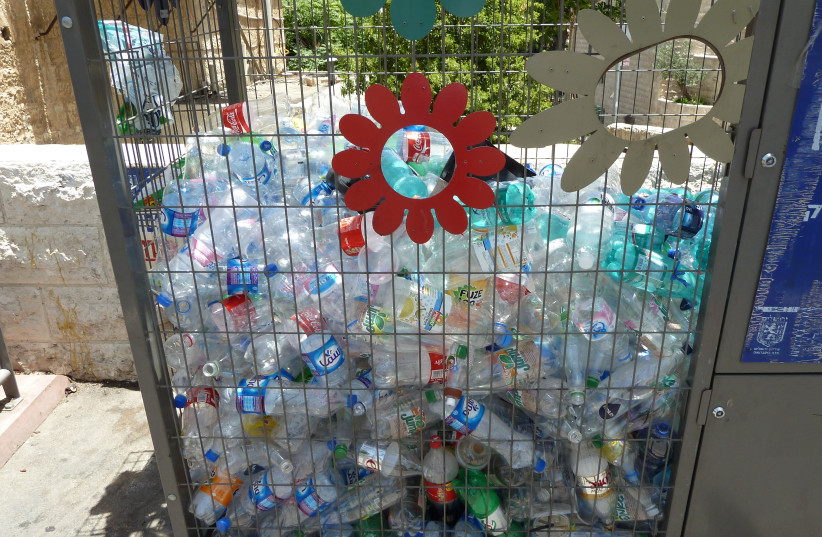Israeli law requires monetary deposits be withheld when purchasing most drinks that come in glass, plastic bottles and metal cans. The deposits are returned when empty bottles and cans are brought back to grocery stores for recycling. This system has been in place for years but was expanded on December first to include larger bottles that had previously been excluded from the deposit program.
Environmental groups pushed for years to have the deposit program expanded and celebrated when it finally was. These types of deposits have been shown to increase recycling rates but seven months since the new requirements took effect, we can say that the reform was a half measure and in some places it was self-defeating.
Most grocery stores use machines to receive empty bottles and cans but the machines do not work very well and often reject items that are eligible to be returned for money. Even when machines erroneously reject eligible bottles and cans, store employees must receive them manually to comply with the law. My experience has been that when I go to customer service counters with bottles that were erroneously rejected by machines, I wait in line to speak to employees who are often uninterested, rude and argumentative.
When machines reject bottles and cans that are eligible to be returned for money, people tend to just leave them next to the machines which often have collections of bottles and cans around them that I have seen employees just throw out. Expanding the deposit program does not do anything when in-store collection is administered so poorly. Additionally, many people are uninterested in schlepping their garbage back to the store.
There used to be cages spread out along Israeli sidewalks to collect recyclable plastics but these cages have disappeared from many parts of the country, in part due to the expanded use of the orange bins that the Tamir Corporation uses to collect plastics and certain other recyclable materials. Tamir also collects items that are recyclable but which are not included in the deposit program, like bottles that had contained milk or milk products like chocolate milk, soap and shampoo bottles and vegetable cans.

Why can't we recycle everything?
THE ONLY reason to exclude things like vegetable cans and milk bottles from the deposit requirement is because of pressure from special interest groups, such as industry lobbyists and ultra-Orthodox politicians, who tend to oppose such measures.
Meanwhile, the expansion of the bottle deposit program prompted the city of Jerusalem to decide that they no longer needed the cages. Though Jerusalem does not have the orange bins, cages began disappearing from the city even before the expansion of the bottle deposit program went into effect. Jerusalem residents have been left with no way to dispose of bottles that had contained milk products or many other recyclable plastics and they have never had a good way to dispose of vegetable cans, aside from a brief, poorly advertised program that had allowed metals to be thrown into bins together with electronics but which has since been discontinued.
Some people believe that Jerusalem’s GreenNet Recycling and Waste Treatment facility, which sorts through garbage and removes various items that do not belong in landfills, provides for recycling without requiring residential sorting. However, recyclable materials pulled from a garbage stream tend to be of lower quality than raw materials would be, had they been presorted. GreenNet may be a backup for recovering recyclables thrown in the garbage but it is not ideal for turning post-consumer materials into valuable resources.
The orange bin issue
In February, Jerusalem agreed to contract with Tamir for the orange bins but the bins have still not been set up. Suffice it to say, Jerusalem Mayor Moshe Lion might not be one of Israel’s foremost environmentalists, but Israel’s outgoing governing coalition includes ministers like Minister of Environmental Protection Tamar Zandberg and Knesset Members like Alon Tal, who do purport to advocate for environmental causes. Though the coalition is on its way out, it survived for just over a year and recycling is not thought of as one of the issues that divided it.
Alon Tal, Tamar Zandberg and other environmentally oriented members of the coalition were elected to prioritize environmentalism over the interests of grocery stores, milk companies, the ultra-Orthodox and other special interests. The deposit program needs to be further expanded as soon as possible to include all recyclable product containers, such as vegetable cans and milk bottles. Furthermore, the deposit will only be effective if in-store collection is administered properly.
Recycling machines are required to meet operational standards and laws requiring grocery stores to receive recyclables and they need to be enforced much more stringently. They need to account not just for the stores’ eventual willingness to take the items but also for the ease of the process and the deterrent impact of things like faulty machines and long customer service lines.
The writer lives in Jerusalem. Previous columns of his have appeared in media outlets in both the US and Israel.
